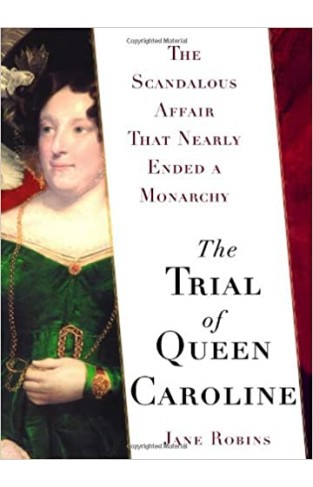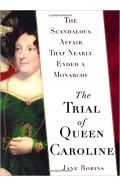- Home
- Categories
- Non Fiction
- Biography/Autobiography
- The Trial of Queen Caroline: The Scandalous Affair that Nearly Ended a Monarchy
The Trial of Queen Caroline: The Scandalous Affair that Nearly Ended a Monarchy
By: JANE ROBINS
-
Rs 1,935.00
- Rs 2,150.00
- 10%
You save Rs 215.00.
Due to constant currency fluctuation, prices are subject to change with or without notice.
Before Charles and Diana, before the impeachment of Bill Clinton, and long before the slogan "the personal is political," an astonishing British royal sex scandal threatened to trigger a revolution. Its lessons for leadership, popularity, and the impact of the absurd on history are fascinating. In The Trial of Queen Caroline, Jane Robins tells the story of one of history's least happy marriages. The future George IV could not be bothered to meet Caroline, Princess of Brunswick, a woman "with indelicate manners...and not very inviting appearance," before she arrived for the wedding. He was immediately disgusted by her. He far preferred one of his mistresses, whom he had secretly married in a Catholic ceremony, knowing that the British state would not recognize the marriage if it ever came to light. In 1797, just three years after George and Caroline wed, the couple separated. George wrote to her that "our inclinations are not in our power, nor should either of us be held answerable to the other. "As Robins relates, Caroline took him at his word and proceeded to live exactly as she pleased, departing for Europe and a life of scandalous associations and debauched parties. Rumors of Caroline's lifestyle soon reached George, still Prince of Wales, who determined that she would never become Queen. To the shock of the nation, he demanded that the popular Caroline face a trial for adultery. The potential consequences included a death sentence at worst, and certain divorce and disgrace. The voice of the popular press, raised in anger for the first time in Britain, roared in disapproval. Riots spread in the countryside. The mother of a single, deceased child, Caroline became the public's favorite martyr. Jane Robins combines prodigious archival research with a sharp eye for telling detail. She shows how the rise of the partisan press helped magnify the story, until, at its peak, Caroline's trial became the story of a bad marriage that brought England to the very brink of revolution.
Before Charles and Diana, before the impeachment of Bill Clinton, and long before the slogan "the personal is political," an astonishing British royal sex scandal threatened to trigger a revolution. Its lessons for leadership, popularity, and the impact of the absurd on history are fascinating. In The Trial of Queen Caroline, Jane Robins tells the story of one of history's least happy marriages. The future George IV could not be bothered to meet Caroline, Princess of Brunswick, a woman "with indelicate manners...and not very inviting appearance," before she arrived for the wedding. He was immediately disgusted by her. He far preferred one of his mistresses, whom he had secretly married in a Catholic ceremony, knowing that the British state would not recognize the marriage if it ever came to light. In 1797, just three years after George and Caroline wed, the couple separated. George wrote to her that "our inclinations are not in our power, nor should either of us be held answerable to the other. "As Robins relates, Caroline took him at his word and proceeded to live exactly as she pleased, departing for Europe and a life of scandalous associations and debauched parties. Rumors of Caroline's lifestyle soon reached George, still Prince of Wales, who determined that she would never become Queen. To the shock of the nation, he demanded that the popular Caroline face a trial for adultery. The potential consequences included a death sentence at worst, and certain divorce and disgrace. The voice of the popular press, raised in anger for the first time in Britain, roared in disapproval. Riots spread in the countryside. The mother of a single, deceased child, Caroline became the public's favorite martyr. Jane Robins combines prodigious archival research with a sharp eye for telling detail. She shows how the rise of the partisan press helped magnify the story, until, at its peak, Caroline's trial became the story of a bad marriage that brought England to the very brink of revolution.
The Trial of Queen Caroline: The Scandalous Affair that Nearly Ended a Monarchy
By: JANE ROBINS
Rs 1,935.00 Rs 2,150.00 Ex Tax :Rs 1,935.00
Zubin Mehta: A Musical Journey (An Authorized Biography)
By: VOID - Bakhtiar K. Dadabhoy
Rs 472.50 Rs 1,050.00 Ex Tax :Rs 472.50
Myths Illusions and Peace: Finding a New Direction for America in the Middle East
By: Dennis Ross
Rs 985.50 Rs 1,095.00 Ex Tax :Rs 985.50
Operation Dark Heart: Spycraft And Special Ops On The Frontlines Of Afghanistan And The Path To Victory
By: Anthony Shaffer
Rs 2,025.00 Rs 2,250.00 Ex Tax :Rs 2,025.00
Anna Hazare: The Face Of Indias Fight Against Corruption
By: Pradeep Thakur
Rs 225.00 Rs 300.00 Ex Tax :Rs 225.00
How To Win A Cosmic War God Globalization And The End Of War
By: Reza Aslan
Rs 625.50 Rs 695.00 Ex Tax :Rs 625.50
Witness To America: A Documentary History Of The United States From The Revolution To Today
By: Douglas Brinkley
Rs 4,495.50 Rs 4,995.00 Ex Tax :Rs 4,495.50
No recently viewed books available at the moment.
Zubin Mehta: A Musical Journey (An Authorized Biography)
By: VOID - Bakhtiar K. Dadabhoy
Rs 472.50 Rs 1,050.00 Ex Tax :Rs 472.50
The Trial of Queen Caroline: The Scandalous Affair that Nearly Ended a Monarchy
By: JANE ROBINS
Rs 1,935.00 Rs 2,150.00 Ex Tax :Rs 1,935.00














-120x187.jpg?q6)














